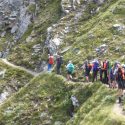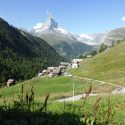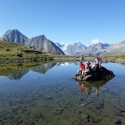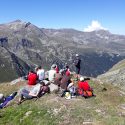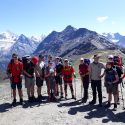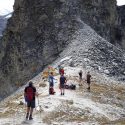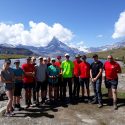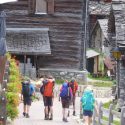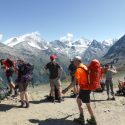Air Cadets have successfully completed an overseas expedition in the Swiss Alps. The challenging trek saw all members of the group complete part of the Chamonix to Zermatt Haute route and culminating in the ascent of Underrrothorn.
The expedition was organised by West Mercian Wing of the Air Training Corps to provide a challenging physical journey that would fulfil the Corps motto ‘Venture Adventure’. An overseas trek promised to bring new experiences to the cadet participants through culture, language and most importantly the mountain environment that would surpass anything they had previously experienced. The venture would consist of two parts; the five day trek and then the ascent of Underrothorn. The team was joined by Commandant Air Cadets on this venture.
The first challenge was to get the diverse range of individuals working together as a team. This was achieved through regular emails and newsletters. The most profitable was a weekend training venture in Snowdonia where the team got to know each other and importantly work together. It also proved useful for the team to find what they really needed to carry in their expedition packs.
The outward journey was from RAF Cosford, via Manchester airport, to Geneva where we spent the first night. The following day we left Geneva and travelled by train to Sion and from there by bus to the start of the trek, the village of Evolene.
The first leg of the trek was to La Sage, although a short day in distance, it was straight into a 300m ascent. La Sage was the team’s first experience of sleeping in an alpine hut. The following day, after breakfast, was the start of the toughest day from La Sage to Cabane de Moiry, a 1200m ascent to the Col de Tsate then a 950m descent to the Lac de Moiry followed by a 500m ascent to the Cabane at the side of the Moiry glacier. The views and experience of sleeping next to a glacier and listening to it creak was one of the experiences of the trip.
The next day we set off, retracing our steps to the Lac de Moiry then walking along its shore until we reached the Barrage de Moiry (dam). Crossing the dam then a 600m ascent to cross over the Col de Sorebois and descending into Zinal. The next leg was a 800m ascent, more gradual slope but the final 150m being steep, to cross over the Meidpass, leaving the French speaking region and entering the German speaking region and a steep descent to Gruben. The final leg of the trek, which was considered to be the second toughest day, started with an 1100m ascent from Gruben to the Augstbordpass, 2894m (the highest point of the trek). Then descending and contouring round the valleys to reach Jungen. The final experience of the trek was the cable car descending the 2000m to St Niklaus. Trekking phase over, we took a train to Zermatt.
A bonus to the trip was a visit to Air Zermatt Mountain Rescue which included a look around one of their helicopters and a brief of the work they do and training required. After a short tour of Zermatt and a brief history of the first ascent of the Matterhorn, the team had the day to explore and get souvenirs.
Second part of the venture was the summiting of Unterrothorn. The team put on their much lighter rucksacks and started to ascend the first 800m to the Stellisee which offered a fantastic view of the Matterhorn. After lunch and a rest a few of the team ascended Unterrothorn reaching the summit, proud of their achievements.
Air Commodore D McCafferty: “I thoroughly enjoyed the expedition and felt I had stretched myself physically and emotionally to find new levels of resilience I didn’t know I had.”
Cadet Sargent Harry Kingston: “I enjoyed the experience and view of being in the Alps and learning skills of mountaineering and expedition planning”
Cadet Flight Sargent Luke Thomas: “Throughout this expedition I’ve enjoyed the amazing views and all the passes we went over. It’s been unreal, absolutely amazing” “
The most important skill that came from this experience was teamwork. It was inspiring to see how individuals supported each other throughout the expedition. In conclusion we consider this expedition a great success with many of the group wanting to travel again further broadening their horizons and opening their minds to new opportunities.
Squadron Leader Bill Hoe who organised the expedition commented ‘We are very grateful to the Ulysses Trust for their generous grant which helped the cadets achieve a huge amount from this expedition, apart from one, none of whom had been trekking overseas before’.
The Ulysses Trust also wish to thank the generosity of the Royal Air Force Charitable Trust for supporting this expedition. www.rafct.com

